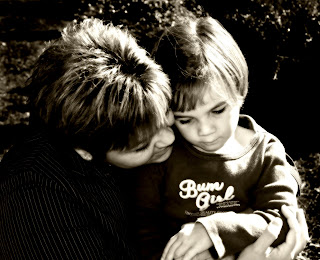I’ve seen the story many times – and experienced it almost as much. You just arrived at a family event with your daughter. The moment you arrive, your normally socially outgoing child suddenly turns into a scared little girl wanting to have nothing to do with anyone. You try hard to draw her out of the shell she has abruptly put herself in but you can’t understand why she is so afraid. She knows these people, has spent time with them and normally loves to be with them. What could be wrong?
So often our extended family members LIVE for time with the little ones in their family. Most of the time hugs and kisses are required etiquette for family functions. Your child may be socially outgoing but when a group of people suddenly want something from her – a hug – she may not be ready to give it. In truth requiring her to give out hugs and kisses when she does not want to is a violation of her body. You are making her do something with her body that she does not feel comfortable doing.
So first of all, stick up for your child and do not demand that she give hugs and kisses or even handshakes to people when she is not ready to. Believe me, there will come a time you want your child – boy and girl - to have that sense of who can and cannot be trusted when dealing with others. By respecting the boundaries she is setting, you are instilling self-worth in her. You are showing her that she gets to choose what she does with her body and who she chooses to express love to, with it.
So first of all, stick up for your child and do not demand that she give hugs and kisses or even handshakes to people when she is not ready to. Believe me, there will come a time you want your child – boy and girl - to have that sense of who can and cannot be trusted when dealing with others. By respecting the boundaries she is setting, you are instilling self-worth in her. You are showing her that she gets to choose what she does with her body and who she chooses to express love to, with it.
Very often family members live for these visits with our children. They look forward to it as a way to feel loved themselves. However, it is not your child’s responsibility to make you or any family member feel loved so it may be necessary to have a conversation with these family members. The truth is that they simply want to express their love for your child. Perhaps you can suggest that your family members wait a little while when they first see her. Then after a little while they could come up and ask your child for a hug instead of grabbing her and giving it.
In order to encourage your child to physically show love, there are a few things that you CAN do. The first is to make sure that YOU are giving out hugs and kisses to the family. Sometimes we expect our children to “give Aunt Erma a kiss” because it is something we are not comfortable doing ourselves. This is a mistake because children tend to follow our lead on these things. They want to be like us and if we walk in the door and immediately give aunt Erma a hug and kiss, it does a two things. 1 – It takes a little pressure off our child by giving Aunt Erma some of the attention and love she needs and 2 – It models for our children that it is safe and loving to give hugs and kisses to Aunt Erma.
The other thing you can do is to talk with your child before you get to these kinds of events. You can remind her that there are going to be a lot of people that love her and may want to show their love with a hug and kiss. Ask your child if she is okay with that. If she is not, ask her if there is a way that she would like to show her love for them. Suggest a handshake, fist bump or maybe she would like to make a card for everyone. When you get to the event, quickly remind your family and friends that your daughter may not be ready to give out hugs but that she might be later. However she has made a card to show that she does love everyone. It is vitally important that you sick up for your child in this experiences.



